What is a mother? You may think she’s a selfless, loving, patient, warm woman. She might be. But that’s not what makes a mother.
As someone who wrote an entire doctoral dissertation on this subject, you’d think I’d have a pretty clear idea of how to answer the question, “What is a mother?” But the fact of the matter is I’m not sure it’s a question that’s actually answerable. I don’t think we can say exactly who or what makes a mother.
Something I do know, though, is that a mother is not what you’ve been told. At least, that’s not all she is.
Asking what makes a mother is an all-important question because it forces us to explore, think critically, consider others, and better understand ourselves.
This post answers questions like these about motherhood:
- What does it mean to be a mother?
- What are the qualities of a mother?
- What are the duties of a mother?
- What defines a good parent?
Hint: The answer is basically, “It’s different for everyone.” But we’ll get there.


This site contains affiliate links, meaning that we earn a small commission for purchases made through our site. We only recommend products we personally use, love, or have thoroughly vetted.
What Is a Mother?
In trying to define what who and what a mother is, we sort of do the opposite of what this website is about. We’re about undefining. We recognize the things people shouldn’t be expected to do simply because of their gender or parental status.
But by looking for ways to target what makes mother according to social definitions, we can expand those definitions. I hope we can get rid of them entirely.
At Undefining Motherhood, a mother is anyone who provides care to the world. Or, anyone who considers herself one. Simply put, being a mother is not a definition; it’s a feeling.
We hope that someday, this will be the “definition.”
Expanding The Defintion
By “undefining” motherhood, we can call people mothers who historically haven’t been given that label.
People who consider themselves mothers can be, even if they don’t meet the typical social definition.
In other words, having a child you’ve either birthed or adopted that people can see you caring for is not what makes you a mother.
The answer to “What is a mother?” is not “Someone who has birthed a child.” Period.
But to convince people of this truth, we need stories and experiences from people who mother differently. We need to see how someone can be a mother outside of our typical social constructs.
By identifying how these nontraditional parents are, in fact, mothers in some way, we take steps that get us closer to our ultimate goal of undefining motherhood.
How Do We Define Words and Ideas?
Freud defined things involving women in terms of lack. A man was a man because he had a penis. A woman was a woman not because she had a vagina, but because she lacked a penis.
And as much as I don’t like to take Freud as my major example of how to live, think, or write, he was no idiot. A total ass and misogynistic narcissist, sure. But not a dummy.
I see aspects of his methodology of thought that we can effectively adopt here in attempt to figure out what a mother is.
In short, to know what makes a mother, we need to know what a mother is not.
What A Mother Is Not
She’s not the Victorian angel in the house (named from Coventry Patmore’s disturbing but once popular poem), a devoted and submissive wife who lives patiently and tirelessly for the comfort of others.
She is not a selfless, giving, caring creature who ceases to exist outside of her children as soon as they are born.
I found this book in a boutique recently: What Are Moms Made Of?
Curious, given my own research, I bought it. A coffee-table style book, the kind someone might give someone for Mother’s Day with all good intentions, it lauds the same kinds of disturbing expectations as Patmore’s Victorian absurdities.

Sorry to break it to you, world, but a mom is not always “full-hearted’ and “generous,” nor is she always “graceful” or “calm.”
Nor is she necessarily the selfless angel we want her to be. When I Googled the question, “What is a mother?”, the words I saw most were “selfless,” “strong,” “loving,” “sacrifice,” “instinct,” and “never complains.”
But let me be real with you. Do I consider myself a strong woman who loves my child with intensity and will sacrifice abundantly for him? Hell yes!
Am I selfless, ever trusting in my supposed maternal instinct, and willing to fully sacrifice without complaining? Hell no!
And I think I’m a great mom.
#notjustamom exists for a reason, y’all. Moms do a lot for their children, but most of them do a lot for themselves, and I hope the rest of the world, too.
No one can fit the outlandish definitions our society has constructed for what it means to be a mother.
And to expect her to adhere to them is to place unnatural expectations that lead us all to feel like we’re constantly failing.
WE ARE NOT FAILING! WE ARE LIVING!
What is a mother?
A mother is not someone who gives up her entire life and person to raise children.
Because who are those children, if their mom has no life of her own?
What are they learning about life, about personhood, about womanhood?
This makes me think of a quote from a rather old column in The Observer:
“You can recognize the people who live for others by the haunted looks on the faces of the others.”
Katharine Whitehorn
I hope my child never has that haunted look.
I hope he knows a mom who is an example of strength, resilience, independence, bravery, while also being one of compassion and love.
I hope that when he wonders what makes a mother, he thinks of boldness, assertiveness, independence, love, grace.
Who is a mother?
Here’s the thing. I became a mother when I chose to be one. When I felt like one. Not when I had a baby in my arms.
In the years I was wading my way through the dense, muddy waters of dealing with recurrent miscarriage, I found myself devastated by the fact that no one considered me a mother.
I can tell you one thing with certainty.
If you ask, “What is a mother?” almost no one will tell you that it’s the warrior woman pushing her way through infertility, miscarriage, or adoption.
No one will tell you it’s the heart longing for a child but waiting for a partner to help create one.
No one will tell you that’s what makes a mother.
But it does.
Was I a mother during recurrent miscarriage?

I polled my Instagram followers with this photo. The question: “When all of my children were born into Heaven, with none on this earth, would you have called me a “mother”?
The answer was a resounding “YES!” “Absolutely!” “Of course!”
And yet, at the time, very few people actually recognized me as a mother.
There was that one amazing friend who validated that I was a mother over and over again. She’s a remarkable example of effectively helping a friend through a miscarriage.
But everyone who’s been through infertility, pregnancy loss, or adoption knows how rare it is that people recognize you as a mother.
When I hid away on Mother’s Day for fear of people not recognizing me as a mother, I was one to myself.
In a later, better year, on Jack’s first Mother’s Day on earth, people continually wished me a happy “first Mother’s Day.”
I couldn’t fathom how anyone thought that it was my first Mother’s Day. Especially given the fact that I had been 8 months pregnant the Mother’s Day prior. At 8 months pregnant, did I not count yet?
When Jack was almost a year old, I thought it was my 4th Mother’s Day, but everyone around me considered it my first.
They were wrong. I became a mother when I felt like one.
So what makes a mother?
I can tell you this. It wasn’t Jack. I was a mother before I ever conceived my precious son.
I’m reminded of another quote:
“The moment a child is born, the mother is also born. She never existed before. The woman existed, but the mother, never. A mother is something absolutely new.”
Osho, formerly Rajneesh, the late Indian Spiritual guru
I’ve heard this quote time and time again, and I’ve seen it listed endlessly on blogs and Hallmark-type websites listing “the best quotes for Mother’s Day.”
Sorry, Osho, but I call bullshit.
Was I not a mother before I was lucky enough to birth a living child, despite him being my fifth pregnancy? Yes; I was.
Was Jacquie not yet a mother on that grief-ridden Christmas when she had a D&C on Christmas Eve? Yes; she was. Read Jacquie’s story here.
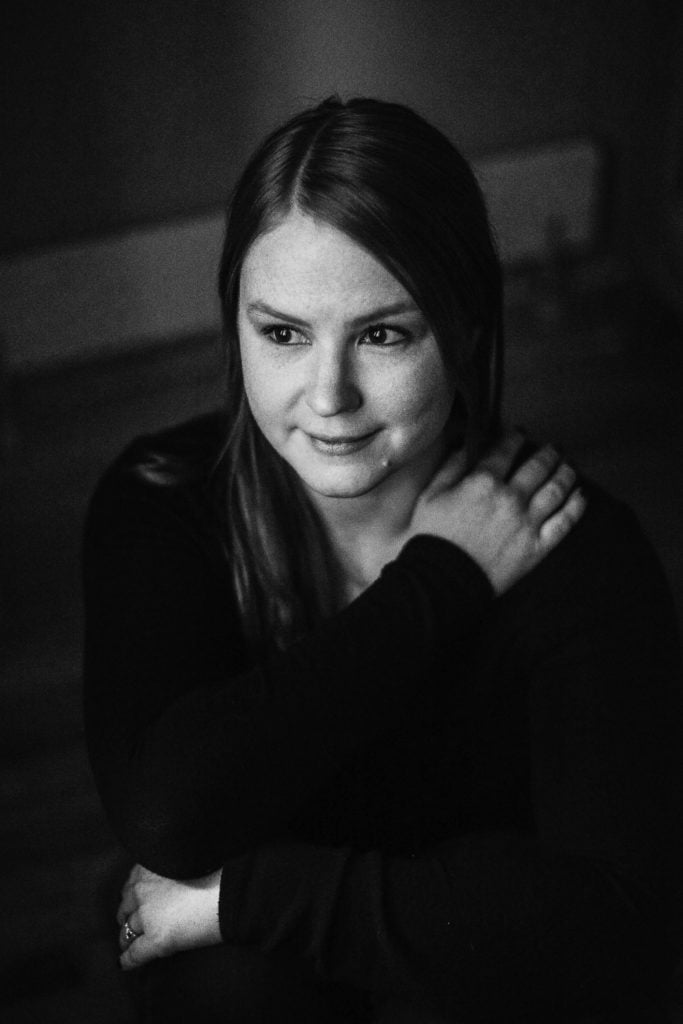
Photo Credit: Ann Hughes Photography (Infant Loss Photography Project)
Was Hannah not a mother after birthing Senna Lynn, born sleeping, at 41 weeks? Abso-fucking-lutely she was. Read Hannah’s story here.
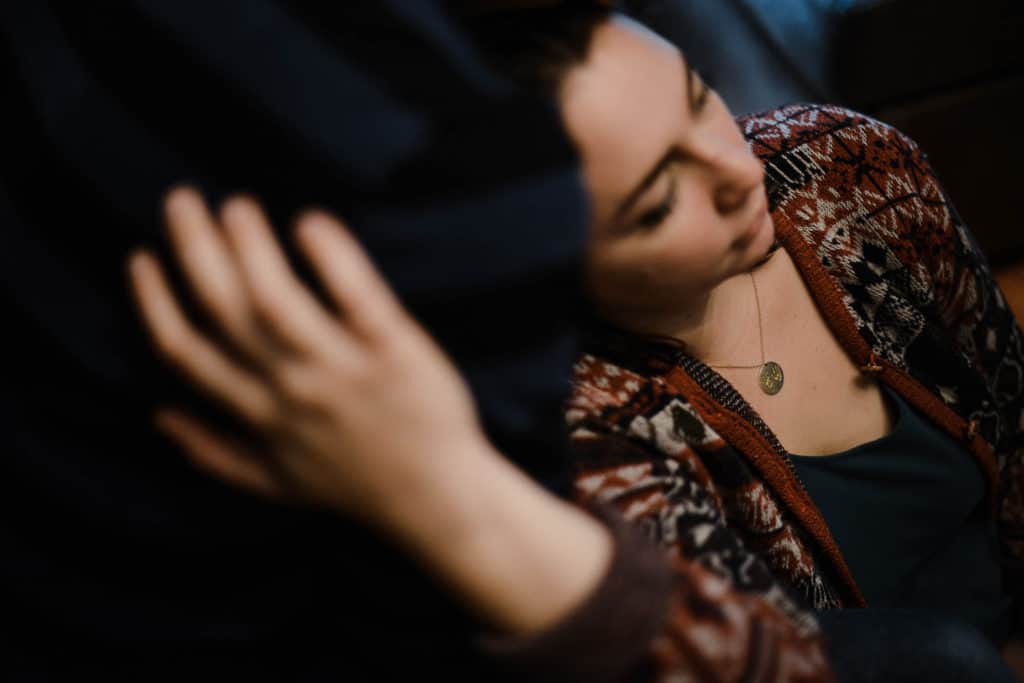
Photo Credit: Ann Hughes Photography (Infant Loss Photography Project)
Or did Hannah get the title while Jacquie and I didn’t because she had “birthed” a child, an experience that does not come with early pregnancy loss? (That’s another semantic conversation for another day, just for the record.)
Was she excluded from “motherhood” because she didn’t have a living child?
Or was she in a more liminal place because she’d carried to full-term, but then had to say goodbye?
I Call Bullshit on All of It!
I asked Hannah when she thinks she became a “mother.”
She carried Senna Lynn past full-term, and then had a live birth a year later. Hannah’s life and heart and body were put through hell in so many ways that I have no idea how she ever managed to sort them out.
But she did. Because she’s a fighter. And because what else could she do?
So I figured, who’s more qualified to tell me what makes a mother than her?
And without knowing my goals or hopes or expectations for this article, she said exactly what I had been trying to articulate all along.
I don’t think motherhood has anything to do with the limitations of biological maternity or legal rights. Rather, it has to do with the love we experience for the little ones we care for. When we become mothers, a part of our hearts we never knew existed unlocks.
I think back to the moment I saw my firstborn, Senna Lynn, who had died hours before being born, 3 days after her due date, and remember the overwhelming feeling I got. People say it’s love, but I don’t think that one simple word does it justice. For me, it’s a love deserving of a whole new name. A love which is not limited by death, sickness, distance, or turmoil. It is palpable, unconditional, and ethereal.
For me personally, I didn’t come to know this love before I met Senna. Even though I had a miscarriage prior to conceiving her, I didn’t feel that connection until I saw her perfectly formed face.
But it isn’t the same for everyone. I know from interviewing other mothers for the Infant Loss Photography Project that for some, that love starts to grow the second they see a second line.
Hannah Kirk-Aubut
Check out some of Hannah’s articles about Senna Lynn’s stillbirth and parenting her living child at the following links:
- Her story of what it’s like having a baby after stillbirth
- A letter to her dear rainbow baby
- Her (correct) insistence that she’s a good mom, mo matter her parenting style
- A raw and honest look at parenting after loss
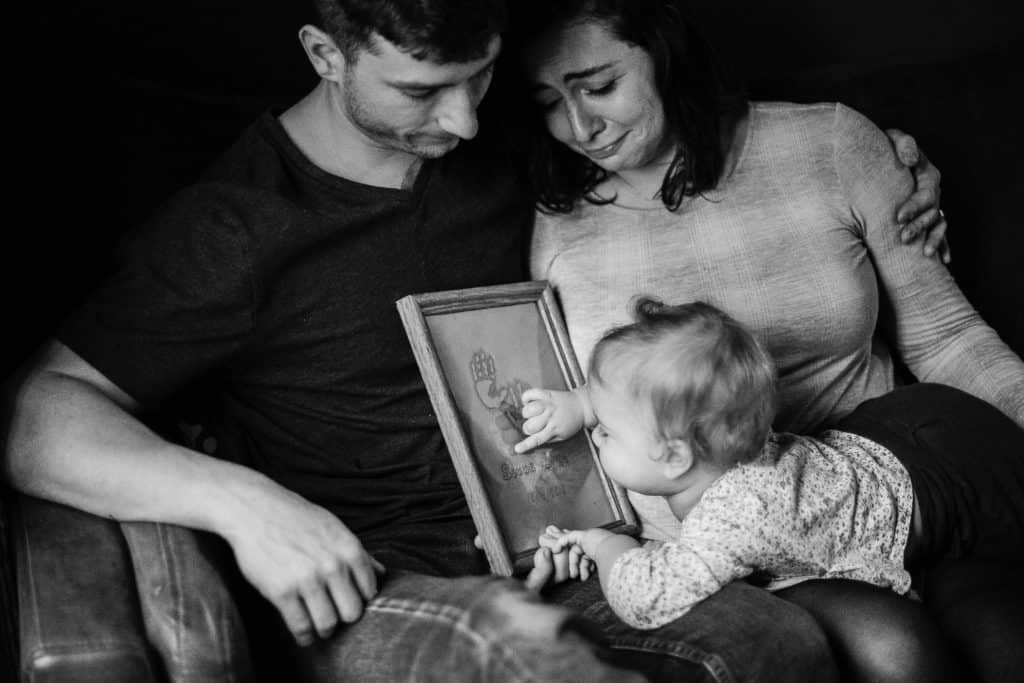
Photo Credit: Ann Hughes Photography (Infant Loss Photography Project)
It’s Different for Everyone
I have only one thing to add to Hannah’s point. “It isn’t the same for everyone.” For some women, that love starts to grow the second they imagine the second line on a pregnancy test.
For others, it starts to grow when they make the decision to begin the arduous process of adoption, or IVF, or IUI.
For many, it starts as soon as they lay eyes on a niece, or nephew, or child in a classroom.
It begins when they realize that the world will not end with their own lives, and that they want to help create a better place for children of the future.
All that to say, the love Hannah describes can begin with birthing a child. But it doesn’t have to.
And neither does being a mother.
Biology does not make a mother, nor does the legal paperwork of adoption or foster parenting.
Motherhood is not a definition. It’s a feeling.
So what made me a mother?
I don’t know. But no matter how abundantly thankful I am to have him, it wasn’t Jack. I was a mother long before I had Jack.
Was it when I became pregnant the first time?
Not all women want to be pregnant. Does the fact that they don’t want to be pregnant make them not mothers?
Was it when I decided I wanted to conceive, even though it took a long time to get pregnant?
Was I a mother the day I became an aunt? Even though I didn’t want children of my own yet, I spent hours and hours sitting alone in my niece’s nursery putting together furniture because she came unexpectedly early and her room wasn’t ready.
I practiced my swaddle on baby dolls. I did everything I could to help during what I knew—but absolutely did not understand—would be a hard time for her parents.
Did that make me a mother, in some way?
Was it sometime in between?
If I’d never had children, would I be a mother in some way? Could I be a mother in some way?
MY ANSWER IS YES!
Bonus moms make the world go ’round!
Types of Mothers
When I say “bonus mom,” I mean people who mother differently. Not women who parent their own children, or their adopted children, but other people’s children.
People who mother the world are part of what makes a mother.
They’re mentors, foster parents, aunts.
They’re single dads, grandparents, nannies, and other caregivers.
They’re people who mother their own parents through sickness or old age.
They’re stepmothers, given a bad reputation in fairy tales, but who knowingly choose to take on a child as their own, often navigating tricky adult relationships along the way.
They’re teachers, nurses, aid workers, humanitarians, and everyone else who works to help people of the world can call themselves mothers if they feel like they are.

I believe you can live your life without ever birthing or adopting or fostering a child, and you can still be a mother.
Are You a Mother?
If you make the world a better place for the sake of future generations, you can most certainly be a mother. If you feel like one.
What about people who mother their siblings, their friends, the world?
What about people who choose not to have children because they genuinely believe it’s not a fit for them? What about women like Sabrina, who loves kids, is an amazing aunt and mentor, but remains childfree by choice?
These people don’t believe that they should have children. They know children won’t fulfill them and make them happy.
And yet they work to improve the world and make it a better place to live in—are they, in some way, mothers? I think so, if they want to be.
Not everyone wants to be a mother, and that’s equally as okay. #notamom exists for a reason too.
But if you feel like a mother, and you’re caring for the world, then you are one to me.
I’ll reiterate Hannah’s point one more time, just for good measure. “It isn’t the same for everybody.”
Many of the people I’ve talked about above consider themselves mothers in some way, or would like to. Many do not. And that’s okay. That’s really the whole damn point.
If you consider yourself a mother, when do you believe you became one?
TTC Articles
- How tracking fertility changed my life
- 2ww TTC: How to survive the 2 week wait
- Strange early pregnancy symptoms stories
Articles about Pregnancy
- Baby registry must haves + PRINTABLE baby registry checklist PDF
- To do list before baby with PRINTABLE checklist
- Writing a birth plan: the ultimate birthing checklist
- Hospital bag checklist printable
- Labor induction at 37 weeks
Articles about Postpartum
- Postpartum body image
- Postpartum + nursing pajamas for hospital and home
- Must-have postpartum supplies

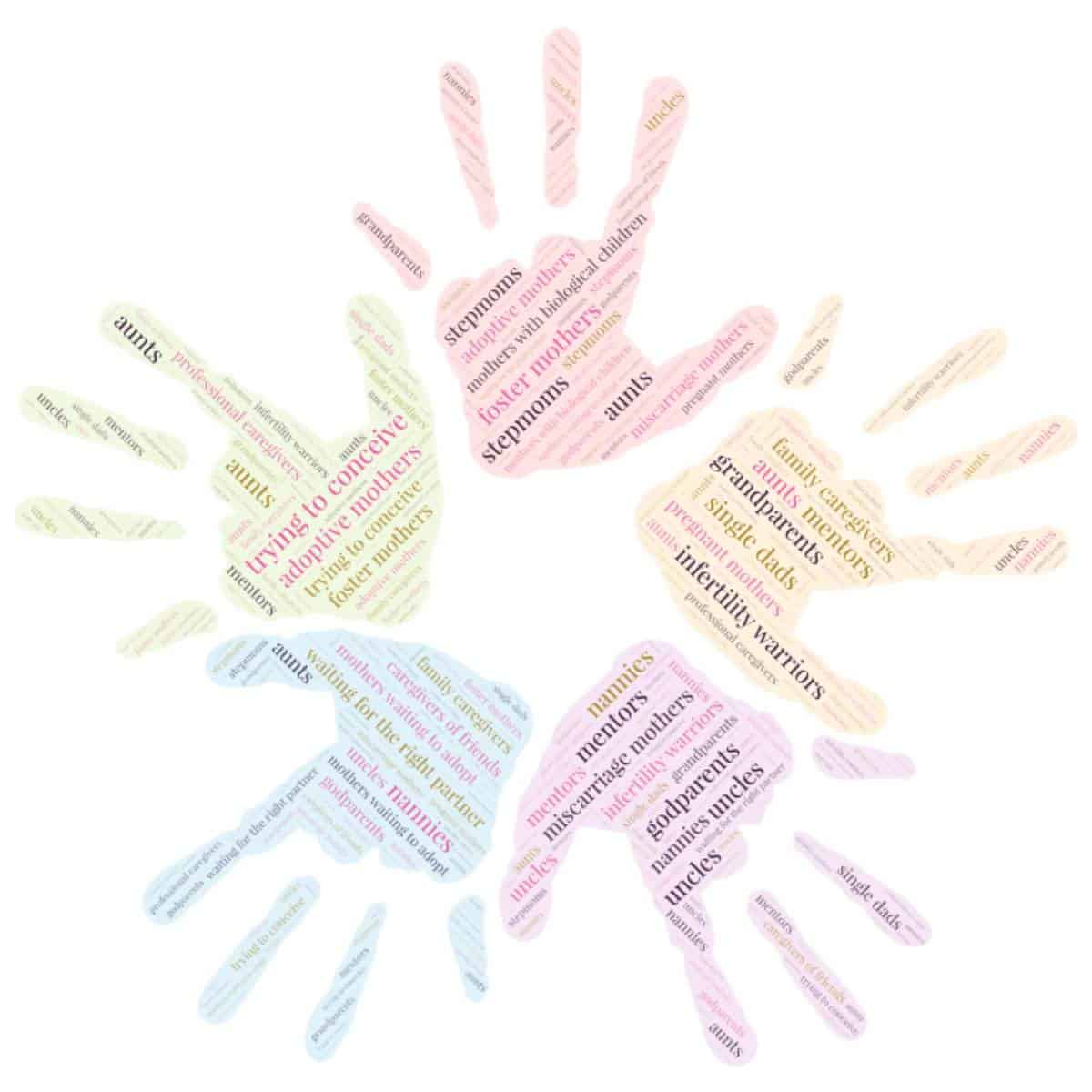

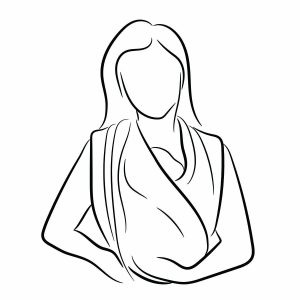
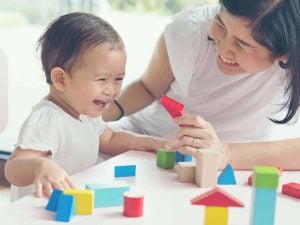
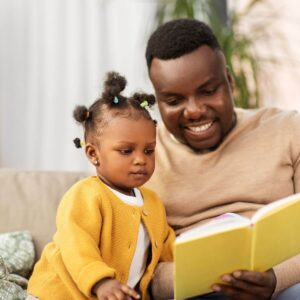




Thank you for this wonderful introductory post. I’ve had feelings about this in the past, but have never explored or articulated them before. It’s a conversation worth having, and I’m glad it’s beginning.
Thank you! I know people will think I’m just getting hung up on semantics, but I think words are so important, and I’ve seen how the ideas around motherhood create tension and frustration for so many women!
I completely agree! My great-aunt Rita couldn’t even get pregnant because of an operation that she had in the early 1930s. Doctors had to remove her uterus and one ovary when she was just 15 years old. She realized much later when my grandmother, her sister, died leaving behind 11 children and a widower, that she was supposed to be “child-less” because her nieces and nephews would need her to mother them. My great-uncle Fred married Aunt Rita knowing she couldn’t have children, he always referred to her as mother. They moved my Dad and his siblings into their house for the first eight months after my grandma past away. My dad was just 18 and starting his trade life in electrical work. His older sister had just married the year before. The 10 children living with my aunt and uncle ranged in age from 18yrs – 10months. I can’t imagine what my life would be like if it wasn’t for my Aunt Rita and Uncle Fred. They were both parents and grandparents without ever conceiving a single child.
What an amazing story this is. This is exactly the type of thing that I mean – we need caregivers of all types, and I hate that so many feel robbed of the idea that they’re mothers for taking on these responsibilities. Thank you so much for sharing, and thank God for your Aunt Rita and Uncle Fred! Once again, surrogate mothers make the world go ’round.
Thank you for putting what I’ve been feeling to words! I could never articulate it quite well, but I’ve been a mother since that first positive pregnancy test last April, crying tears of joy on the floor with my fiancé as we planned for our baby’s future. I lost that little one at 8 weeks, and then another this January at 21+5, but I am #stillamom. I will celebrate Mother’s Day and I will celebrate my fiancé on Father’s Day and we will remind the world that not all parents get to parent their children on earth.
Oh, honey, I am so sorry for what you’ve been through. You are, in every way, #stillamom. So much love your way!
This is so beautifully articulating so many feelings I have about this subject. ANd yes – I felt like a mother the first time I realized it was going to be a fight to become one, through the treatments and the disappointments. Now that I am parenting three kids, I can most definitely say I am NOT always the calm in the storm, nor am I selfless (come between me and my nightly ME time after 9 pm and you’ll meet the storm, not the calm) but I hope I am always a safe place. Thank you for sharing this.
I feel that I didn’t “become” a mother until I’d had my son for a few days. I adored him immediately when he was born, but we were strangers to each other. I was up for the adventure, but it didn’t quite feel real yet.
Several days in to caring for this cute little stranger, I began to feel the dawning realization that he identified me as his “needs-meeter” and comforter, and that I was beginning to feel more emotion about meeting his needs and ensuring he was happy. That’s when I knew I had experienced a real bond with him. It was different than the adrenaline and excitement and “Aw, isn’t he sweet!” of the first few days. It was the beginning of a lifelong connection.
Women can be moms before they birth a live child…and women can NOT be moms until a few days afterward, if my experience is any indication.
I have to say, though, that I don’t usually think of myself as having become anything. Rather, it feels like I got into a relationship with a brand new person, a relationship that affects my life in new ways. Yes, every intense relationship brings out new facets of our personalities and challenges us and teaches us things, but we stay fundamentally who we are. We are ourselves in our relationships, and that’s why I don’t spend too much time thinking about what it means to “be” a mother. To my son, I’m a mother, but to me, I’m just me 🙂
I could not possibly love this comment more!
I’m a mother. Im also a birth mother and originally planned on keeping her but then her birth father started only coming around when he wanted and was t reliable in addition to other things so I chose adoption to protect her. Not because I didn’t love her or want to take care of her. I may not be the mom she calls mom or knows as her mom but I’m one of her moms that will love her everyday forever and care for her more than she’ll ever know at the pain of my heart. That still makes me a mom. Not just a birth mom but also a mother.